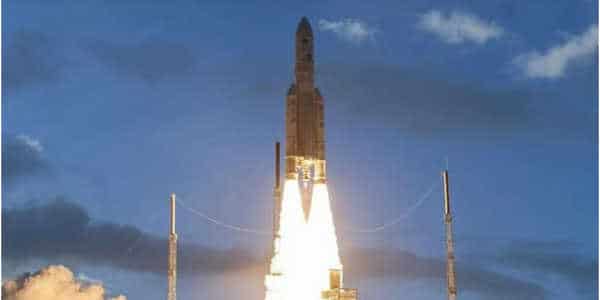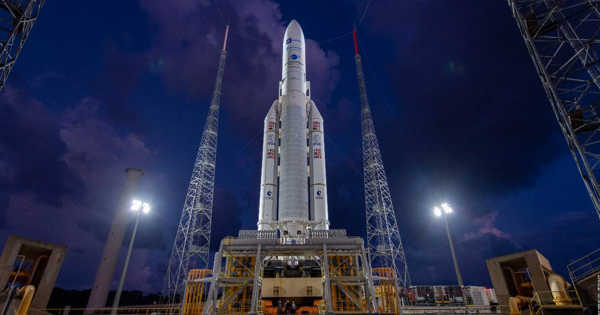The world’s first commercial fully re-programmable satellite launched from French Guiana aboard an Ariane 5 rocket, ushering in a new era of more flexible communications. Unlike traditional models, which are designed and “hard-wired” on Earth and cannot be repurposed once in orbit, the Eutelsat Quantum allows users to tailor communications to their specific needs almost in real-time.
The satellite will be launched into orbit 36 minutes later.
According to the European Space Agency, the Quantum can respond to changing demands for data transmission and secure communications during its 15-year lifetime because it can be reprogrammed while orbiting in a fixed position 35,000 kilometers (22,000 miles) above the Earth.
The world’s first commercial fully re-programmable satellite lifted off from French Guiana on Friday on board an Ariane 5 rocket, ushering in a new era of more flexible communications.
The world’s first commercial fully re-programmable satellite, Eutelsat Quantum, launched from French Guiana on Friday aboard an Ariane 5 rocket, ushering in a new era of more flexible communications. The European Space Agency (ESA) tweeted a photo of the Eutelsat Quantum satellite lifting off, describing it as the “world’s first commercial fully flexible software-defined satellite.”
The 3.5-ton Quantum model has eight communications beams, each of which can be customized to change its area of coverage as well as the power of the telecommunications signal it emits. According to Eutelsat, these changes can be made “in a matter of minutes” using customer-provided software.
This means that the satellite can provide mobile coverage for moving objects such as aircraft or ocean-going vessels, as well as coverage following a natural disaster or for one-time events.
And, at a time when there is growing concerned about digital security and the potential weaponization of space, Quantum is able to pinpoint the origin of signals emitted with or without malicious intent and take action to mitigate the interference. For the next 15 years, the Quantum will cover a vast geographical area stretching from West Africa to Asia.

“Eutelsat Quantum, developed through an ESA partnership project with satellite operator Eutelsat and prime manufacturer Airbus, is the world’s first commercial fully flexible software-defined satellite,” the space agency said in a statement. Because it can be reprogrammed in orbit, it can respond to changing data transmission and secure communications demands over the course of its 15-year lifespan. Its beams can be redirected in real-time to provide information to passengers on moving ships or planes.
Space junk concerns
Moriba Jah, the lead researcher for AstriaGraph, a website that tracks space debris in orbit, told CGTN Europe earlier this year that the components of old rocket bodies were “ticking timebombs” due to the potential risk of collisions.
They could collide with active satellites that provide vital systems on Earth, or they could explode into thousands of pieces, resulting in “super-spreader events” as they continue to orbit the planet, according to Jah. Germany established a new space command in July, a military body tasked with monitoring space, protecting satellites, and tracking space debris.
Currently, Germany monitors approximately 30,000 pieces of space debris with a diameter of 10 centimeters or greater – a size assumed by the ESA to have the potential to destroy a typical satellite.
Commercial operators such as Elon Musk’s SpaceX and its Starlink network, which aims to launch tens of thousands of satellites to provide global space-based wifi, are contributing to the increase in debris.
















